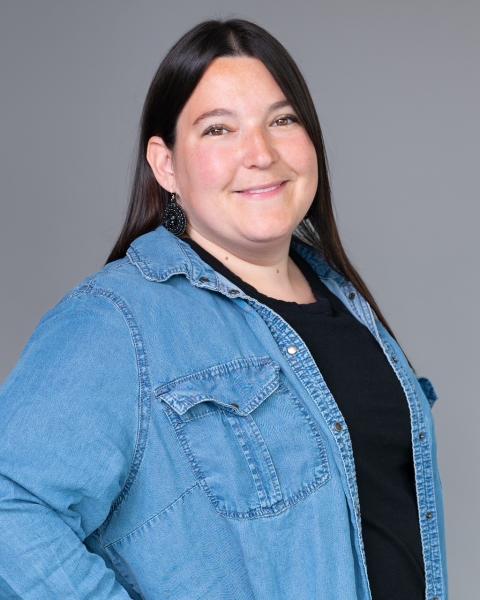Channelle Beaumont, Mi’kmaw Indigenous patient navigator, works to “give patients a voice, improve health outcomes”

Channelle Beaumont is a Mi’kmaw Indigenous Patient Navigator (MIPN) who was initially drawn to a career in healthcare because she’d experienced her own health challenges and knew how hard it was to navigate the system.
Now, Channelle is helping other Mi’kmaq and Indigenous patients and families navigate the system, working to, “ensure they receive the culturally appropriate care that they rightfully deserve.”
From Annapolis Valley First Nation, Channelle started her healthcare career as a licensed practical nurse working in her community. That role was both rewarding and challenging. “I found it hard to set boundaries between living in community and working in community,” she said. Ultimately, she decided to devote her talent, skill and passion for Indigenous health in a different way, as an MIPN supporting Nova Scotia Health’s Western Zone, which includes Annapolis Valley, South Shore and Southwest Nova Scotia.
Channelle is one of five MIPNs at Nova Scotia Health. The MIPN role is important because Indigenous individuals and communities encounter specific obstacles in accessing healthcare, she said. These include cultural differences, the impacts of historical trauma, and systemic discrimination.
“As MIPNs, we’re committed to meeting the needs of Indigenous patients. We can help improve trust and communication between healthcare providers and patients. The biggest thing that I’d like patients to know and understand is that we’re trying to make a meaningful impact on the health and wellbeing of our patients. We want to give patients a voice and improve health outcomes.”
The role of MIPN looks different day-to-day. “Sometimes we’re out in hospital working with patients. Other days we’re in the office, making phone calls back and forth between communities and families and patients, getting things organized, planning a discharge from hospital, and setting up appropriate resources, like home care. It’s great if a patient is connected to a First Nation community – the health centres in community are great about that.”
Channelle said the biggest challenge she faces is, “Every patient and every care plan is so different and there’s no guide to follow. When we go in to meet a patient, we never know what to expect. We put in a constant effort to meet these individual needs and help the patient as they maneuver through the healthcare system.”
The role brings rewards too. Channelle said she’s learning a lot about the health field, and just as much about Indigenous culture, having grown up in a First Nation community where a lot of culture had been lost. “A lot of times we get requests for ceremonies and teachings – sometimes I don’t know what they are. I love it. I feel like I’m constantly learning.”
The MIPN role is designed not only to support patients and families, but healthcare teams. Channelle reinforces the uniqueness of Indigenous health and said she encourages healthcare providers to reach out when they have questions. In the year since Channelle started as MIPN, “a lot of people are reaching out. They’re realizing we’re here and utilizing our services more.”
One tangible difference in the past year is, “We put smudge kits in all Western Zone hospitals. I know they’re being used in some locations already.” Smudge kits contain all the materials necessary to perform a smudging ceremony, a traditional healing ritual important to many Indigenous people.
Channelle said some patients and families who know her from community will reach out directly, while other referrals come from healthcare teams. Both are welcome.
To reach Channelle or any of the other four MIPNs in the province, visit https://www.nshealth.ca/clinics-programs-and-services/mikmaw-indigenous-patient-navigator-mipn
Photo of Channelle Beaumont.